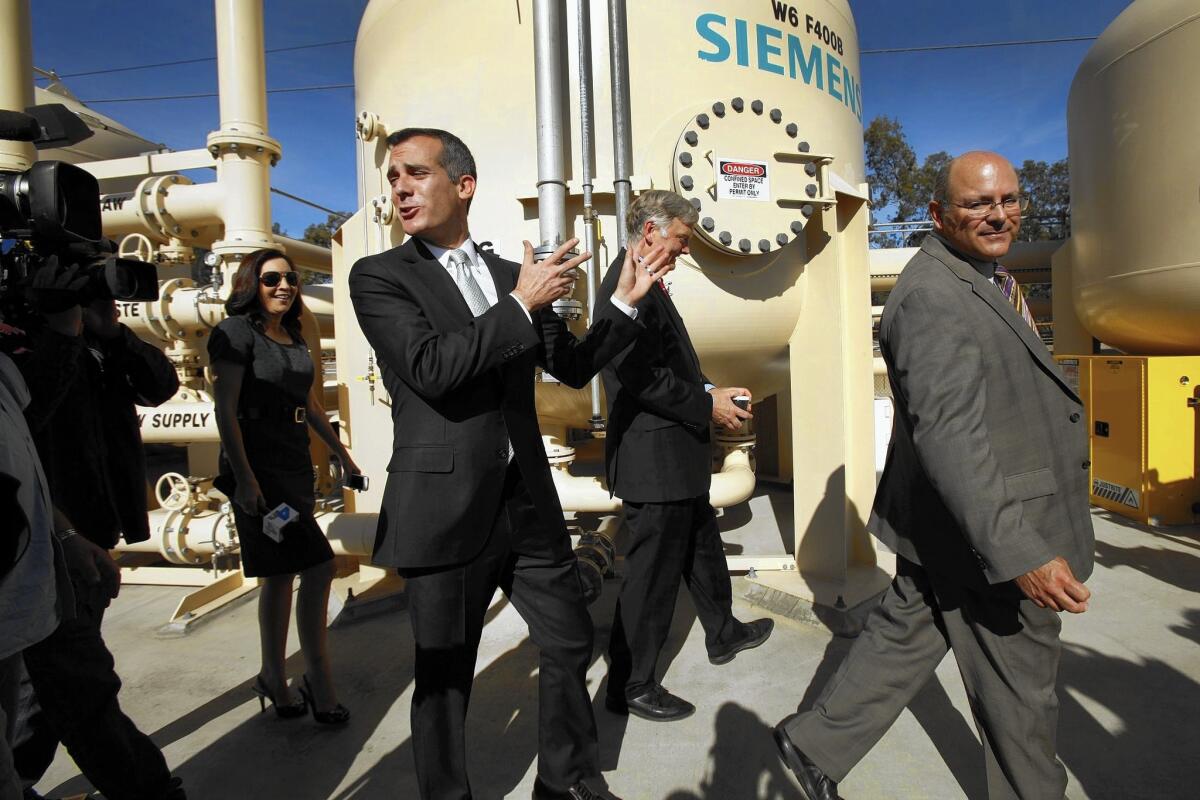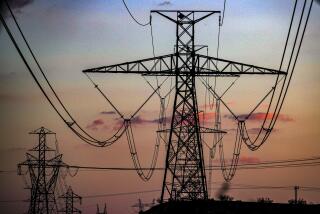DWP wants a rate hike, but what about Mayor Garcetti’s ‘mandate to reform’?

Los Angeles Mayor Eric Garcetti took office claiming a “clear mandate to reform” the city’s Department of Water and Power, a little-loved bureaucracy that Garcetti bashed time after time on the 2013 campaign trail.
Today, as the DWP — the nation’s largest government-run utility — prepares to ask Angelenos to pay more for water and electricity halfway through the mayor’s first term, that mandate looks a long way from being fulfilled.
Garcetti has taken steps to curb what some call lavish pay and benefits for DWP workers, and he has earned praise for choosing an effective new department head. Yet the agency has made little or no progress on key measures of performance, ranking dead last among comparable utilities this year in one of the industry’s most respected customer-satisfaction surveys.
The mayor said in an interview that there has been improvement at the utility under his administration, but that reform should be a “constant lens” for looking at DWP operations rather than a laundry list of specific accomplishments.
“Reform is a value and will be an ongoing mission,” he said. “It’s not just trust, but it has to rest on trust. It’s not just metrics, but it has to have key metrics. It’s not just changing some of the systems, but it has to have systems change as well.”
But with the department seeking combined water and electricity rate hikes totaling 18% over the next five years — an average monthly increase of about $24 for the typical household — some question whether change has come fast enough. Last year, Garcetti told Angelenos that the department must “earn back your trust” before he would let it raise rates to pay for repairs to the city’s crumbling pipes and power lines.
If Garcetti chooses to endorse the rate increase — so far he has demurred — the mayor could have a credibility gap among those who remember his campaign strategy, according to veteran political consultant Sean Clegg, who ran a political action committee supporting Garcetti’s opponent in the mayoral race, former City Controller Wendy Greuel.
Garcetti’s strategy involved a grim barrage of sepia-toned television attack ads calling Greuel “the DWP’s mayor,” noting the agency’s employee union had spent millions toward her election and suggesting voters would pay more for their water and electricity if she won.
“There’s a cognitive dissonance, and it’s going to be a huge challenge for the mayor to bridge that gap,” Clegg said. “I don’t think there’s a lot of evidence for the broader public that the utility has been reformed.”
Jack Humphreville, a member of the Greater Wilshire Neighborhood Council who tracks DWP issues, said Garcetti has avoided deep institutional changes to the utility, such as halting the city’s practice of tapping excess ratepayer money to shore up other departments’ budgets or curbing the outsize influence of the International Brotherhood of Electrical Workers Local 18, the union that represents most DWP workers.
“I don’t know what he means by ‘reform,’” Humphreville said. “You just haven’t seen any of the real organizational reform or structural reform that Eric’s talking about.”
Agita over the provision of water and power is a distinctive part of L.A.’s political culture. Long before “Chinatown” made the DWP a fixture of film noir, a local mythology had grown up around the agency whose monumental system of aqueducts allowed a sprawling city to take root in the Los Angeles Basin.
DWP’s special status has bred an unusually high level of morale and autonomy among its employees, said Raphael Sonenshein, executive director of the Pat Brown Institute for Public Affairs at Cal State L.A.
Yet a side effect of the department’s proud internal culture has been a slowness to embrace other modern utilities’ emphasis on customer satisfaction. That has, in turn, led to DWP’s curious predicament: It provides water and power more reliably and cheaply than many other California utilities — and is hated nonetheless.
“DWP still does a very good job of providing water and power to its customers at more than competitive rates,” Sonenshein said. “At the same time, that has probably not been enough to guarantee its long-term public support.”
For Garcetti, who styles himself a data-driven executive in the mold of former New York City Mayor Michael Bloomberg, the numbers on DWP customer care under his watch don’t tell an entirely encouraging story.
In July, the consumer-research group J.D. Power and Associates ranked DWP last among more than a dozen large Western power providers in its survey of business and residential customers for the fourth year in a row. DWP General Manager Marcie Edwards has said the survey’s findings are a crucial barometer of her agency’s success.
Meanwhile, the average customer call wait time — another metric the mayor cites as a way to gauge the agency’s performance — more than doubled during Garcetti’s first two years in office, according to a Los Angeles Times analysis of DWP data.
That average was almost 19 minutes, compared with a little longer than seven minutes during the final two years of former Mayor Antonio Villaraigosa’s administration. City officials say the delays were created by a deluge of calls from customers complaining about the botched rollout of a new DWP billing system three months after Garcetti took office.
Public perception of the city’s commitment to reform has also been muddied by political missteps.
Edwards, whom Garcetti appointed to oversee the utility in 2014, has earned respect among many at City Hall for her managerial competence. But even she has not been free from controversy: In April, she cosigned a letter with DWP union head Brian D’Arcy assailing an audit of two labor-affiliated nonprofit groups that engaged in questionable spending of tens of millions of dollars of ratepayer money.
It was a conspicuous break with the mayor, who had called for the audit and quickly disavowed Edwards’ comments. Within days, she publicly apologized, but the episode left some questioning her willingness to stand up to organized labor.
Edwards, who had worked for more than two decades at the DWP before taking a job in Anaheim, said she was seeking to bring balance to an “engineering-driven” agency where for years “the customers were almost a sideline.” Among her initiatives was the hiring of 160 new customer-service representatives — a process she said was delayed for more than a year because of government civil-service rules.
She said it would take time for such improvements to be reflected in customer-satisfaction surveys like those performed by J.D. Power.
“DWP is going to be a work in progress,” she said.
Garcetti said he could already point to a number of positive achievements at the utility during his years as mayor, such as the signing of a relatively austere contract with the IBEW that included pension reductions for newly hired workers and a three-year postponement of raises. The mayor also noted the agency finally resolved a century-long legal battle over L.A.’s draining of Owens Lake.
He said the department has begun an important “benchmarking” study of its weaknesses and strengths compared to other utilities.
The mayor, who was City Council president from 2006 to 2012, said his administration was not to blame for the spike in call wait times because the faulty billing system was largely prepared under his predecessor. In July and August of this year, he noted, DWP met its goal of shrinking average wait times below three minutes.
“I never want to plant the flag and declare victory,” he said. “But I always want to see forward progress.”
The City Council is expected to vote on raising rates by the end of this year. The mayor has said he is generally in favor of increases to improve DWP’s infrastructure, a frequent focus of news reports showing broken mains gushing water through the streets amid a statewide drought.
But he has so far refused to explicitly endorse the department’s proposed increases, which would raise combined water and electricity rates by about 3.4% annually over the next five years for typical customers.
Fred Pickel, the city’s independent ratepayer advocate whose office was established by voters in 2011 as a watchdog over the utility, said that Garcetti has put in place a strong foundation for reform but that much crucial work lies ahead — and may not be completed in the near future.
“I think the reform process has moved along,” Pickel said. “Is it going to be done before they need a rate increase? Not likely.”
Follow @PeteJamison for news from L.A. City Hall.
More to Read
Start your day right
Sign up for Essential California for news, features and recommendations from the L.A. Times and beyond in your inbox six days a week.
You may occasionally receive promotional content from the Los Angeles Times.







